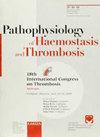Aspirin resistance.
引用次数: 1
Abstract
Platelets are small cells of great importance in thrombosis and inflammation (1). Platelets have a welldefined, critical role in coronary artery thrombosis and other common cardiovascular diseases including stroke, peripheral arterial disease, and diabetes mellitus (1;2). Platelet function tests have been studied in cardiovascular diseases as a means to predict clinical outcomes and to monitor antiplatelet drugs (3). Aspirin irreversibly acetylates serine 529 of cyclooxygenase (COX)-1, resulting in inhibition of thromboxane A2 release from platelets and prostacyclin from endothelial cells (4). Thromboxane A2 induces platelet activation, whereas prostacyclin inhibits platelet activation. Because platelets lack the synthetic machinery to generate significant amounts of new COX, aspirininduced COX-1 inhibition lasts for the lifetime of the platelet. In contrast, endothelial cells retain their capacity to generate new COX and recover normal function shortly after exposure to aspirin. Aspirin is, therefore, an antithrombotic agent.阿司匹林抵抗。
本文章由计算机程序翻译,如有差异,请以英文原文为准。
求助全文
约1分钟内获得全文
求助全文

 求助内容:
求助内容: 应助结果提醒方式:
应助结果提醒方式:


